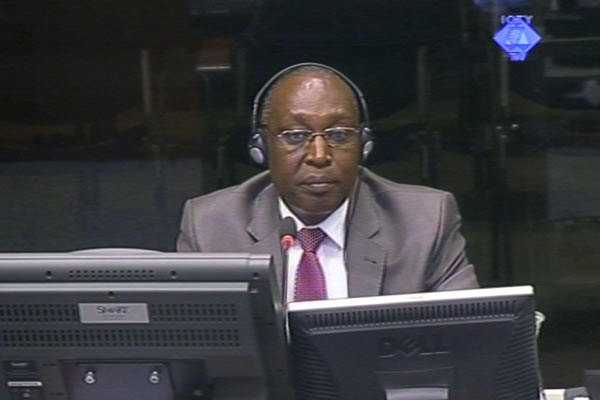Home
KINGORI: IN SREBRENICA MLADIC DIDN’T MEAN WHAT HE SAID
In July 1995, UN military observer Joseph Kingori witnessed the fall of the Srebrenica enclave. Kingori described his two meetings with General Ratko Mladic and Mladic’s conduct in Potocari. According to Kingori, when Mladic assured thousands of refugees in front of the UN base that nothing bad would happen to them, ‘he didn’t mean what he said’
 Joseph Kingori, witness at the Ratko Mladic trial
Joseph Kingori, witness at the Ratko Mladic trial Ratko Mladic again tried to take an active part in his defense during the evidence of Kenyan colonel Joseph Kingori. Several times, Mladic made the ‘time out’ sign in order to be allowed to give instructions to his defense lawyers. He sent them written messages and made loud comments about the course of the trial. This prompted the defense lawyers to tell him to lower his voice.
Kingori and Mladic met for the first time almost exactly 17 years ago, on 12 July 1995, when the Kenyan colonel served as a UN military observer in the Srebrenica area. After they talked a bit about ‘Kenya and athletics’, Kingori tried to explain to Mladic that the UN would provide the buses needed to transport about 30,000 persons gathered in Potocari on 11 July 1995. ‘No, I have my own vehicles’, Mladic replied.
In the video recordings showed in court, Kingori was able to recognize a scene in Potocari when Serb soldiers gave sweets, chocolate and biscuits to children. Ljubomir Borovcanin, commander of the joint police forces, was among the Serbs. According to Kingori, this was just a show for the cameras: once the camera stopped rolling, the VRS soldiers took the sweets away. In another recording, Mladic assures the refugees that ‘nothing bad will happen’ to them and that ‘everyone will be transported [out of the enclave], the big and the small, the old and the young alike’. Mladic said that to allay the fears of the refugees, but it was clear he ‘didn’t mean what he said’, Kingori contends.
At their second meeting, Kingori asked Mladic to let him see the men held in the White House. Kingori believed they were held there ‘in poor conditions’, but wasn’t allowed to visit them. The men were first separated from women and children, and then taken from the White House to some buses, in which they were driven away. Kingori tried to write down their names as they shouted them out while they were being herded onto the buses but he failed. When Kingori asked why the men had been separated, he was told it was done to facilitate the identification of soldiers who would be exchanged for captured VRS soldiers.
In the cross-examination, Mladic’s co-counsel Miodrag Stojanovic put it to the witness that the UN military observers had their HQ in the same building as the BH Army’s 28th Division. Stojanovic also argued that there were five Muslim brigades in the enclave, plus a mountain battalion. According to Kingori, it was ‘impossible’ to maintain such a force in the enclave. A division is a ‘large formation’ which had to have heavy weapons, tanks and artillery support that didn’t exist in Srebrenica. Kingori contends that ‘a handful of civilians without heavy weapons’ operated in the enclave. This was in stark contrast to the VRS, which was a ‘real army’. ‘It would be disproportionate to compare [those troops] with the VRS’, Kingori said.
The discussion about the balance of power between the 28th Division and the VRS caused General Mladic to pay attention. Mladic signaled his approval of some of the things the witness said, and openly disagreed with others. At times, it was apparent that what the witness was saying came as a surprise to Mladic, who talked loudly to his defense lawyers and took notes busily. As the hearing drew to a close, Mladic’s interest in the trial waned and he focused on calisthenics. He started exercising his right arm, did exercises to improve his posture and stretched his torso. At the end, Mladic began smiling and winking, either at the security guards in the courtroom or at the ladies in the public gallery.
